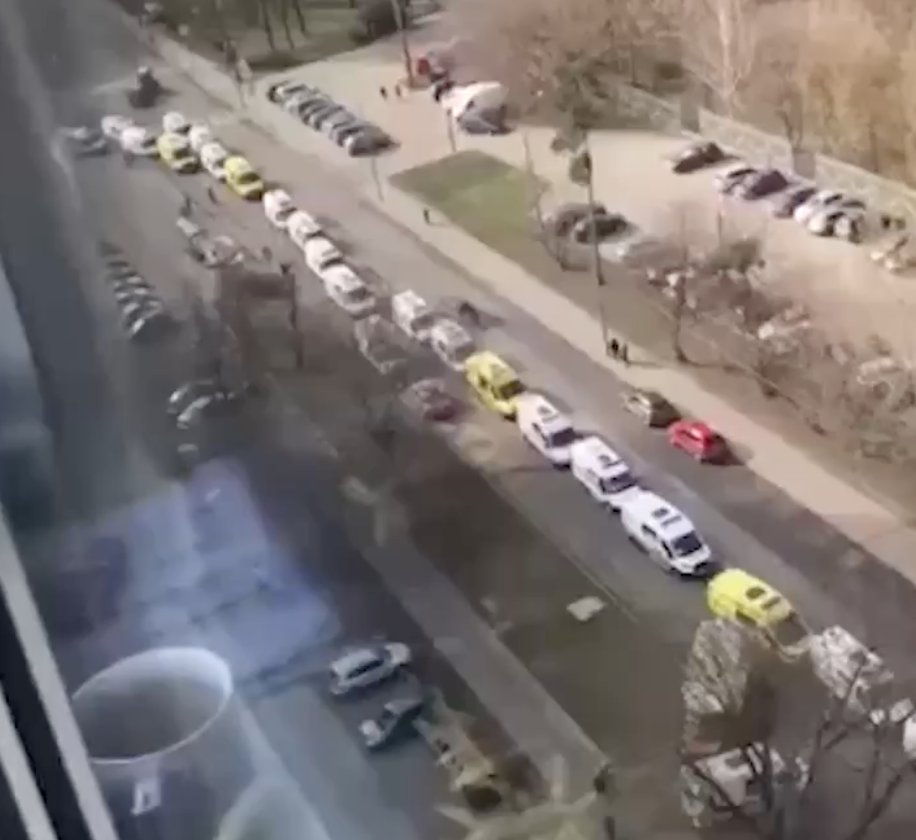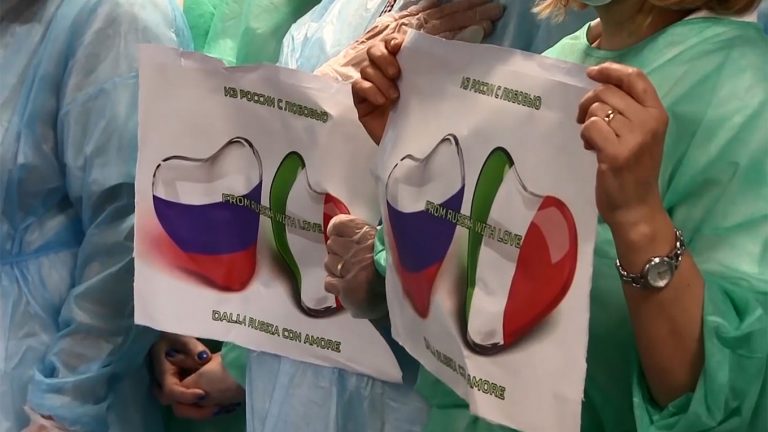Moscow has set about searching WhatsApp subscribers from among Italian citizens to build Russia’s positive image on a fee paid basis. The Italian La Repubblica posted a piece claiming that Moscow had launched a campaign to bribe Italians for propaganda reasons. WhatsApp is spamming an offer of 200 euros to ordinary Italians for a good video comment on Putin, Russia and Russia’s “assistance” to Italy.
The Repubblica got in touch with one girl who posted a fine comment on Russian “assistance” and Putin on TikTok, a social network popular with the youth. The girl explained that her good friend had asked her to record this video. “He said he would be paid 200 euros for that.”
The lansinginstitute.org has previously provided the evidence confirming the La Stampa findings that the Kremlin’s assistance to Italy was Vladimir Putin’s geopolitical and diplomatic project and was 80% useless in the fight against coronavirus.
One of the messages, received by an Italian citizen and quoted by the Repubblica, read: “15 Italians are needed to say something good about Russian humanitarian aid.” The videos should be posted on Twitter, Facebook or Instagram, under the conditions. “They’ll pay 200 euros for a video, but less for a text.”
Though the Russian embassy in Italy denies, the fact that the Russians are searching for the paid-for comments is out of question, as they are actively used, for example, by the Russian Defense Ministry’s information assets, supervised by military intelligence.
This phase of the Russian information campaign in Italy is essential in view of the developments in Russia itself, where the Italian Covid-19 scenario is already seen. There is documented information that hospitals in Moscow and St. Petersburg are unable to cope with the admission of coronavirus patients, there is a critical shortage of medical ventilators, and the doctors are practically forced to euthanize, disconnecting patients from lung ventilators.

Russia’s opposition accuses the authorities of sending lung ventilators abroad, Italy included and selling them to the United States, thus contributing to the equipment and facilities shortage in Russian hospitals. Russian social networks mention several petitions by citizens demanding to ban the export of medical equipment from the country.


In this context, the information campaign is designed to deescalate tensions in Russia itself. The Russian authorities use Russian mental tendency to demonstrate sacrifice to show heroism and messianism. Therefore, the fact of sending ventilators abroad amid a pandemic, that would be perceived as a crime against their own people in Europe, is framed as Russian people’s generosity by the Russian authorities. The Orthodox Church – an instrument of governmental influence on the population in Russia, traditionally infiltrates such narratives into the consciousness of Russians as well. Sacrifice is also used by Moscow in connection to the Second World War, that began amid active cooperation between the Third Reich and the Kremlin and joint operations against the Polish army in Brest. Such facts are covered up and substituted by the wording on Russia’s saving Europe from fascism, brought to the fore. There is no doubt that the Italian campaign of the Russian army will be used as part of run-up to the so-called Victory Day celebration.
The simulated rescue of the citizens in foreign countries is meant to soften the mood of Russians over the state of the healthcare system and the authorities’ policies that had such consequences.
However, the Russians might be persistent in making their aid in Italy valid in a bid to cover up the reasons for the Russian Defense Ministry’s 48th Central Research Institute of Microbiology people present in the country.
This institute is an official chief developer of protective equipment against offensive biological warfare in Russia. It is in the city of Kirov. However, the Institute has been developing the biological warfare since 1937. Some Institute’s tender purchases in 2013-2019 bear the marks of offensive biological weapons development. Its work is mainly focused on hemorrhagic fever. The development of new war viruses has coincided with the development of appropriate vaccines since Soviet times.
In the 1962-1970 timeframe, the Institute developed an inhalation method for vaccination of pulmonary plague on the basis of Yersinia pseudotuberculosis rehydrative vaccine strain’s fine aerosol. Thus, the Institute was developing the viruses that cause pulmonary plague.
The pulmonary form of plague is pneumonia that develops when a person’s respiratory system is infected with an airborne droplet. The infection methods and the clinical form of pulmonary plague are similar to the infection methods and manifestation of Covid-19.
Russia’s campaign to break up the European Union using the Covid-19 crisis has failed. European Commission President Ursula von der Leyen said that at the beginning of the coronavirus pandemic, there wasn’t enough solidarity within the EU, everyone just looked at their problems, and the borders were closed without coordination. Today the will to go through it together has returned, she said. “There are solutions that were unbelievable just half a year ago. Itenhances the sense of community and confidence.”
Russia’s campaign to lift the European sanctions imposed for the Crimea’s annexation, the Donbas invasion, meddling in the elections in the United States and some European countries was a poor success as well. Though the Kremlin would obviously keep on trying to lift the sanctions harassing or bribing the European leaders. Consequently, the Russian leadership is trying to justify the shipment of medical equipment amid these failures, initially seen as the condition for lifting sanctions and Moscow’s rise in Europe.




